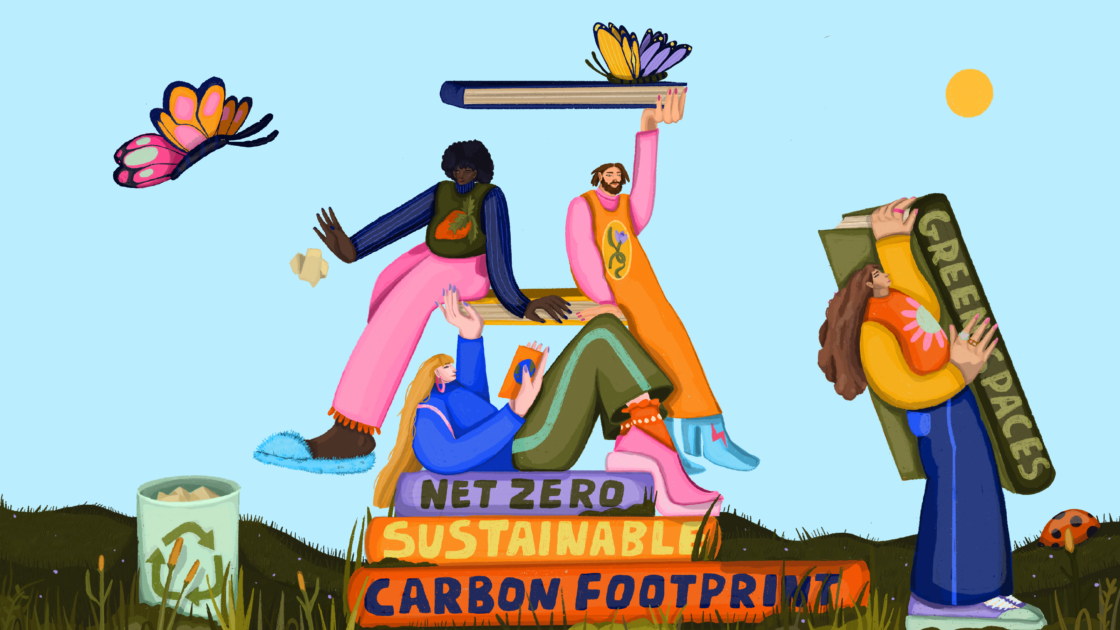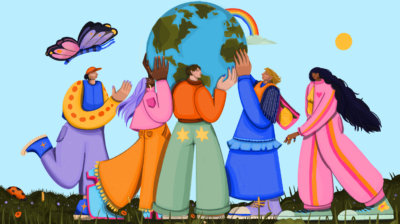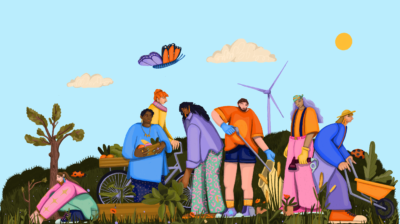Climate Glossary
Deepen your understanding of key phrases used in government policy, the media and climate science with our Climate Glossary.

Climate change is one of the biggest issues of our time and the topic often causes intense debate and conversation. However, it can be hard to keep up with new terms and concepts we hear in government policy, the media and climate science. Our language will continue to change as we learn more about the climate crisis and the best ways to combat its effects on people and nature. You can use this climate glossary to better understand key definitions related to climate change and climate action.
spunout’s climate glossary
A
Adaptation
Taking measures to respond to the changing climate and reduce the potential loss and damage caused by its impacts. For example, in order to adapt to rising sea levels and more frequent storm events, sea walls are built to protect coastal communities.
Anthropogenic
Refers to the influence of human beings on nature. Global warming and climate change are often described as ‘anthropogenic’ or man-made because the current temperature rise and ecosystem breakdown the Earth is experiencing are the direct results of human activity such as burning fossil fuels and deforestation.
B
Biodiversity
The variety of life – including plants, animals, bacteria, and fungi – in an area. Biodiversity is essential to the health of natural ecosystems but is under threat due to the mass extinction of species caused by habitat loss, pollution and climate change. Learn more about biodiversity loss.
Biofuel
Fuel made from biomass, which is plant or animal material, like food waste. Biofuel is a renewable energy source.
C
Carbon budget
A policy or law that sets a limit on the amount of greenhouse gases a country can emit (release into the atmosphere) over a fixed period of time.
Carbon dioxide – CO2
A heat-trapping gas (also known as a greenhouse gas) released into the atmosphere by burning fossil fuels. Increased carbon dioxide emissions are the primary cause of global warming.
Carbon emissions
Occur when gases containing carbon, like carbon dioxide and methane, are released into the atmosphere by human activities such as burning fossil fuels for energy. Carbon emissions are often used to describe all greenhouse gases.
Carbon footprint
The total amount of greenhouse gas emissions linked to a particular product or activity. The higher the carbon footprint, the more the activity or product contributes to climate change. For example, driving a car has a higher carbon footprint than taking public transport.
Carbon neutrality
Also known as climate neutrality or net zero emissions. When the amount of greenhouse gases being released into the atmosphere is balanced or exceeded by the amount of greenhouse gases being removed from the atmosphere. Ireland aims to achieve carbon neutrality by 2050.
Carbon sequestration
The process of taking carbon out of the atmosphere and storing it. This is a naturally occurring process (for example, in forests and oceans) which can help reduce the amount of carbon emissions in the atmosphere.
Carbon sink
A carbon sink is an environment that absorbs more carbon from the atmosphere than it releases. Oceans, peat bogs and plants are examples of natural carbon sinks.
Carbon Tax
A tax set by the government on carbon emissions that aims to discourage businesses and consumers from producing or using fossil fuels.
Circular Economy
An economy where products are designed to create less waste in manufacturing, be longer lasting, easily repaired, reused, upgraded or passed down. Learn more about a circular economy.
Climate Action
Any effort taken to reduce greenhouse gas emissions and adapt to the impacts of climate change. Climate action can be taken on an individual, community, national or international scale. Learn more about how to take climate action.
Climate Action and Low Carbon Development (Amendment) Act
Ireland’s climate law that commits the Government to taking climate action and sets us on a course to achieving carbon neutrality by 2050. Learn more about the Climate Action and Low Carbon Development (Amendment) Act.
Climate change
Long-term change in the Earth’s climate occurring as a result of human activities. To describe how serious the climate change we are experiencing is, the terms climate crisis, climate emergency and climate breakdown are sometimes used instead.
Climate finance
Relates to funding for climate adaptation and mitigation projects to address climate change. International climate finance is about the ways in which wealthy countries can financially support developing countries that are most vulnerable to climate change.
Climate justice
Climate justice is an idea for a fair society where both the burdens and benefits of addressing climate change are shared equally.
Climate literacy
The ability to understand the complex relationship between society and the climate, and how human actions contribute to climate change and environmental degradation.
Climate migration
Occurs when people or groups (known as climate refugees) are forced to leave their homes due to climate-related issues such as droughts, flooding or crop failure. People from countries that are especially vulnerable to climate change and struggling to build climate resilience may have to migrate.
Climate resilience
The ability to successfully prepare for and recover from the impacts of climate change. Mitigation and adaptation measures are needed to build climate resilience. Mitigation means taking measures to limit climate change by reducing the levels of greenhouse gases in the atmosphere.
Conference of the Parties
Also known as the United Nations Climate Change Conference, the Conference of the Parties (COP) is a large meeting of governments from all over the world who are members of the United Nations Framework Convention on Climate Change (UNFCCC). At the Conference, member states assess their progress towards internationally agreed goals to minimise global warming. Learn more about COP.
D
Decarbonisation
Taking measures to reduce the carbon emissions of a country, business or sector of the economy. Also known as mitigation.
E
Electric Vehicle
A vehicle powered by electricity or a combination of fuel and electricity. Electric vehicles are more environmentally friendly than traditional cars because they emit less greenhouse gas emissions.
Energy poverty
The inability to adequately heat or power a home due to the high costs of fuel or electricity. Also known as fuel poverty. Learn more about energy poverty.
European Green Deal
A set of policy plans published by the European Commission (the section of the European Union that creates new rules and laws) in 2019 to respond to the escalating climate crisis and make Europe the first climate neutral continent by 2050.
F
Fossil Fuels
Fuels that form in the Earth’s crust from the remains of dead plants and animals over thousands or millions of years. Fossil fuels – such as coal, oil and gas – are burned to produce energy for heating, electricity and industry and produce greenhouse gases when used.
Fracking
Fracking involves pumping liquids under high pressure into the ground to create cracks in the rock to extract oil or gas. Health and environmental risks associated with fracking include pollution of air and water, gas explosions or leakages, and loss of animal and plant habitats.
G
Global Warming
The rise in the global average temperature, significantly impacting all forms of life on Earth. The average temperature on Earth has warmed by more than 1° Celsius since 1880. Learn more about global warming.
Greenhouse Gases
Gases in the Earth’s atmosphere that trap heat. They are referred to as greenhouse gases because they allow heat from the sun to pass through the atmosphere but prevent the heat from leaving the atmosphere. A buildup of greenhouse gases (such as carbon dioxide, nitrous oxide and methane) in the atmosphere causes global warming.
I
Intergovernmental Panel on Climate Change (IPCC)
Led by the United Nations (UN), the IPCC is made up of a group of scientists nominated by their country to assess the science of climate change. They publish regular reports on the impacts and future risks of climate change.
J
Just transition
Just transition refers to a plan towards carbon neutrality that is fair and inclusive. This means that the costs and benefits of combating climate change are shared equitably across society and do not worsen pre-existing inequalities (such as energy poverty) between individuals and communities.
L
Loss and Damage
A general term used to describe the negative consequences of climate change on people and the environment. Climate change results in loss and damage to human health, biodiversity and habitats, as well as crops, homes and buildings.
M
Mitigation
Taking measures to limit climate change by reducing the levels of greenhouse gases in the atmosphere. Also known as decarbonisation.
N
Nature-based solutions
Using nature to solve social and environmental problems, such as climate change. Reforestation and restoring coral reefs are examples of nature-based solutions.
Net zero emissions
When the amount of greenhouse gases being released into the atmosphere is balanced or exceeded by the amount of greenhouse gases being removed from the atmosphere. This is also known as climate neutrality or carbon neutrality. Ireland aims to achieve net zero emissions by 2050.
O
Ocean Acidification
Increased amounts of carbon dioxide in seawater, causing an increase in the acidity of the ocean. Ocean acidification affects organisms like corals, algae and crustaceans, which in turn damages wider marine ecosystems.
P
Paris Agreement
An international climate treaty adopted in 2015 by the United Nations Conference of the Parties (COP). It is the most ambitious climate agreement to date. It has the goal of keeping the global temperature rise well below 2 degrees celsius and making significant efforts to limit this temperature increase to 1.5 degrees Celsius above pre-industrial levels. “Pre-industrial levels” is the time before the Industrial Revolution, when we started burning fossil fuels in factories. Under the agreement, countries must take significant steps towards decarbonisation. Learn more about the Paris Climate Agreement.
R
Reforestation
Reforestation means replanting forests on land where many trees have been cut down. Similarly, afforestation involves planting trees on land where there were no trees in recent times.
Renewable energy
Energy from resources that can replenish themselves naturally. Renewable energy can be repeatedly used without running out, and produces little to no greenhouse gases, unlike fossil fuels. Renewable energy sources include wind, water and solar power.
Retrofitting
Making changes to a house or building to make it easier to heat and keep heated. Retrofitting reduces carbon emissions and energy costs.
S
Sustainability
A long-term goal to ensure the peaceful coexistence of humans and nature into the future. Related to sustainable development, which promotes the equal development of the economic, social and environmental aspects of sustainability. The United Nations Sustainable Development Goals are a set of goals with the aim of ending poverty, while also protecting the planet and allowing people to experience peace and well-being. Learn more about the Sustainable Development Goals.
U
United Nations Framework Convention on Climate Change (UNFCCC)
The UNFCCC is an international environmental treaty that aims to address the negative impact of human activity on the climate by stabilising greenhouse gas concentrations in the earth’s atmosphere. Ireland is part of the treaty. The Conference of the Parties (COP) is the decision-making body of the UNFCCC.
Feeling overwhelmed and want to talk to someone?
- Get anonymous support 24/7 with our text message support service
- Connect with a trained volunteer who will listen to you, and help you to move forward feeling better
- Whatsapp us now or free-text SPUNOUT to 50808 to begin.
- Find out more about our text message support service
If you are a customer of the 48 or An Post network or cannot get through using the ‘50808’ short code please text HELLO to 086 1800 280 (standard message rates may apply). Some smaller networks do not support short codes like ‘50808’.






